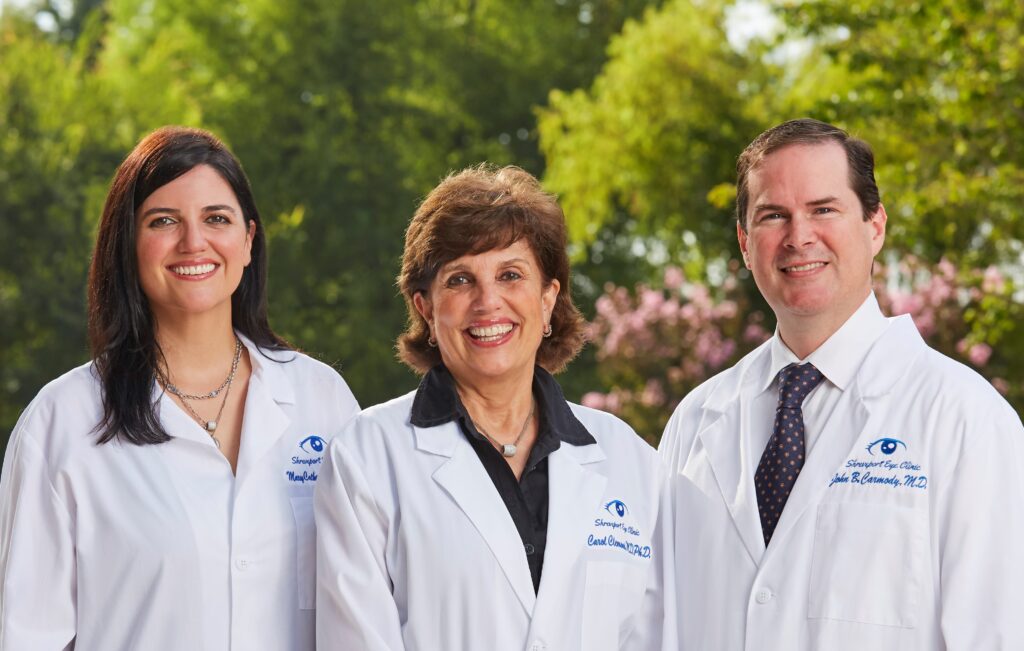
ou’ve likely heard the age-old saying, "The eyes are the windows to the soul." Beyond their aesthetic appeal, however, our eyes also serve a crucial function in our overall health and well-being. Regular eye exams and proper eye care are essential to maintaining healthy eyes and preventing serious eye conditions. We reached out to the ophthalmologists at Shreveport Eye Clinic to get expert insights on what you need to know for your eye health.
How often should people get eye exams?
School aged children are usually screened at school or by their pediatrician and referred for eye exams if there are any concerns found. If they are at high risk for ophthalmologic problems such as prematurity, strabismus, genetic disorders, maternal infections during pregnancy, etc., they should be seen earlier in life.
For adults with no significant ocular history, routine exams should be every 2 years. Age 60 and older should be seen once a year. During your exam, your doctor will be able to tell you if you should be seen more frequently.
What are some common eye diseases, and how can they be prevented or managed?
The risk of glaucoma and macular degeneration and cataracts increases as we get older, especially if there is family history. Routine eye exams will help pick up on those problems. These diseases aren’t painful, and slowly progress, so people don’t know they are occurring until it has significantly impacted their vision. Diabetic retinopathy can develop in those with diabetes. It is recommended someone with diabetes be seen once a year to monitor for damage in the retina due to poor blood sugar control. The frequency of visits goes up once damage appears. An ophthalmologist that is board certified should monitor these conditions.
What are some of the causes and treatment options for common eye problems such as dry eye, eye infections, and allergies?
For dry eye, over the counter artificial tears – Systane, Refresh, TheraTears (not a get the red out drop), are great for lubrication. They are also great for soothing itchy eyes from allergies. There are many over the counter drops for allergy relief (Pataday, Zaditor, Naphcon-A). Most are best used first thing in the morning during allergy season to help prevent allergy eye symptoms from occurring. Remember, allergy medications by mouth can contribute to dry eye symptoms, so lubricating drops can help dry eye symptoms that occur when using those medications by mouth.
If you develop a red irritated eye, and a lot of mucus discharge, it is important to see an ophthalmologist. If you develop a stye, or a swollen, tender knot on your eyelid, use frequent hot compresses with massage. If it doesn’t get better after a few days, then seek out an ophthalmologist.
Blepharitis affects the lid margins. It can contribute to dry eye symptoms, and red, itchy lid margin. It can be managed with good lid hygiene, including hot compresses every morning and evening, lid scrubs, and omega 3 supplements. Try Avenova spray twice a day, sold at Ashley Ridge Optical, for a lid scrub.
What are some symptoms that may indicate a serious eye problem and when should someone seek medical attention?
Symptoms such as a decline in vision, eye pain or irritation, double vision, flashing lights, and floaters are reasons to call an ophthalmologist and schedule an evaluation.
How can people protect their eyes from harmful UV rays and blue light, and what are some recommended eye protection methods?
Sunglasses that are labeled UVA/UVB protection will help block harmful UV rays. Blue light blockers for electronic use are available over the counter without prescription. If you get prescription glasses made, a blue light coating can be added to the lens. Discuss this with the optician making your glasses. A proper hat and sunscreen can help protect your eyes and skin.
From routine eye care to specialized procedures such as LASIK, oculoplastics, or cataract surgery, the physicians at Shreveport Eye Clinic provide expert eye care for your every need. Visit ShreveportEyeClinic.com or call 318.861.4009 to schedule your appointment with Dr. Mary Catherine Clemons, Dr. Carol Clemons, or Dr. John Carmody.


